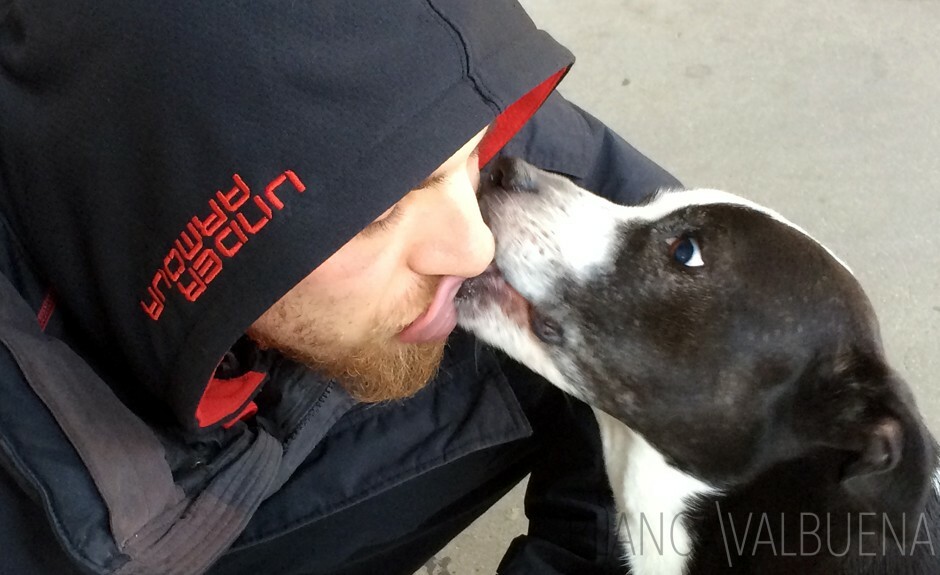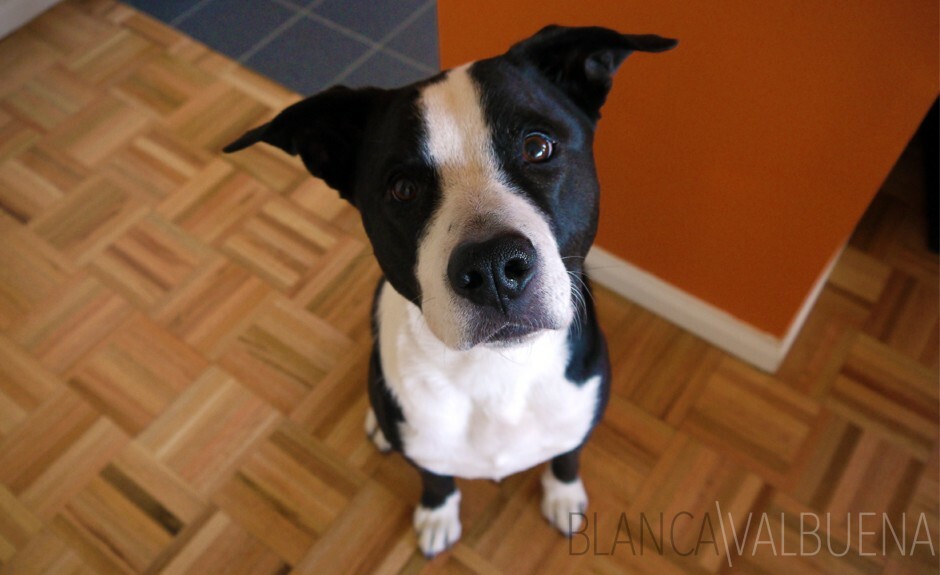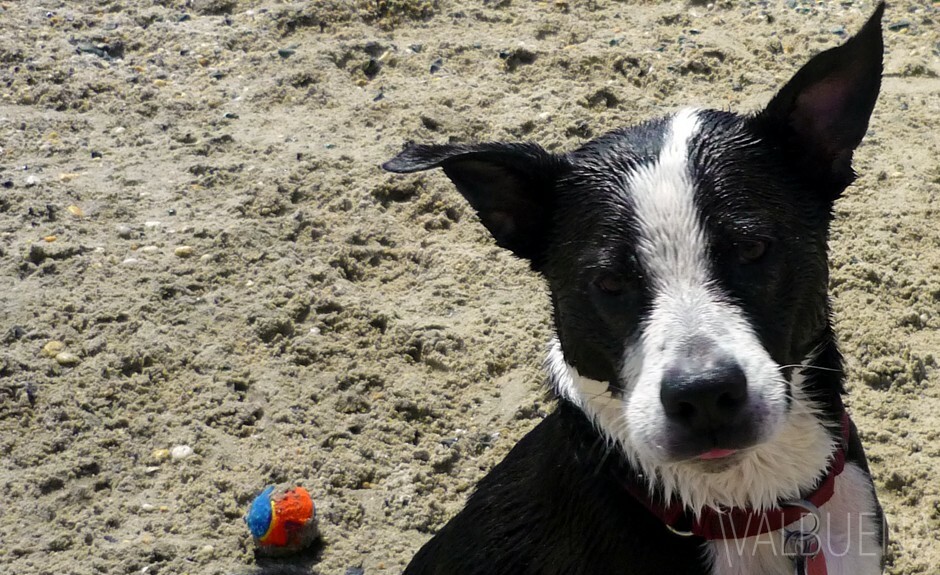Updated 2022

The only danger from my Pit Bull was lots of kisses and stolen food.
Someone recently left a comment on my guide to living in Portugal with a dog article, asking if they would be able to move here with their Pit bull. I was a Pittie guardian, but my guy passed way before we made the move here, so I had to do a little research. It is on a separate post than the first because there is a lot to cover. Here is what I found out about moving to Portugal with a “dangerous” breed.
Things You Need to Know About Bringing your Dangerous Breed Dog to Live in Portugal

What is Considered a Potentially Dangerous Dog Breed in Portugal?
The breeds listed below as well as any mixed dogs that include these breeds are considered to be dangerous dogs in Portugal:
- Fila Brasileiro
- Argentinian Dogo
- Pit Bull Terrier
- Rottweiller
- American Staffordshire Terrier
- Staffordshire Bull Terrier
- Tosa Inu
Can I Move to Portugal with my Pit Bull (Or other dangerous breed)?

GREAT NEWS!!! You can move to Portugal with your potentially dangerous breed.
I wrote the DSPA and I was told that potentially dogs can come to Portugal with their owners, for holidays (up to 4 months) or to stay (for 4 months or more).
If your dog is coming to stay with you in Portugal, you must register them in the national database (SIAC) and get a special detention permit from the parish council of your area of residence, for which you must show certain items (more on this later).
If they are not registered in an officially recognized book of origins, they must be sterilized, and you must provide proof of this.
Your potentially dangerous breed must wear a muzzle and a short leash when outside and in any public places.
If you are bringing your dangerous dog from the EU.

If your dog is coming from a country that is a Member State of the European Union, they must meet the following requirements:
- Your Dog must be microchipped.
- They must have a European Union Pet Passport.
- Your dog must be vaccinated against rabies with a valid anti-rabies vaccine and, for the anti-rabies vaccination to be considered valid, it needs to meet the following requirements:
- Must have been administered when the animal was at least twelve weeks old.
- must have been given after the date of microchipping, otherwise the vaccination will not be considered valid and the animal will have to be vaccinated again, after the application of the microchip.
- 21 days have elapsed after the date of administration of the first rabies vaccine.
- if it is not the first vaccine against rabies, you don’t have to wait the 21 days, and the animal can travel soon after being revaccinated against rabies.
Can I Move to Portugal with my Pit Bull from the USA or Somewhere Outside the EU?

What Are The Requirements to Bring My Pit Bill or Other Potentially Dangerous Breed to Portugal?
- Your dog must be microchipped before or at the same time as their rabies vaccination).
- The rabies vaccination must be valid, which can only take place from 12 weeks of age.
- If at least 21 days have elapsed since the completion of the vaccination protocol required by the manufacturer for the first vaccine (primary vaccination) or if the revaccination (booster) was carried out in compliance with the conditions required for use of the chosen vaccine in the country of origin and consequent indication in the documentation of the animal, otherwise the vaccination to be given to the animal must be considered as a first vaccination.
- The issuance of a health certificate that corresponds to the Community model, validated by the competent official authority of the country of origin.
- The above certificate is valid for 10 days from the date of issue until the date on which the animal is checked at the Travelers’ Point of Entry.
- If your dog is coming over by boat, the period can be extended in relation to the time of the trip.
- A pet passport must be issued in the EU before the animal leaves for a country outside the EU, where the health conditions provided for in the legislation have been registered (example: identification/vaccination/revaccination against rabies/titration of rabies antibodies), is valid on return to the EU to replace the health certificate, if there is no change in these health conditions, thus altering the information in the passport.
- If you are moving to Portugal from a country where the risk of rabies is high, for example Brazil, Venezuela, and Angola, there are other requirements.
- Blood test for sufficient rabies antibodies (carried out in EU-approved laboratories) at least 30 days after rabies vaccination, whether the animal is vaccinated for the first time or of a revaccination.
- A waiting period of 3 months until the animal’s movement to Portugal, counting from the date of blood collection for the analysis.
- The above 3-month period does not apply to the return of an animal that has left the community space already with this analysis carried out with a favorable result, provided that the conditions mentioned above are met.
- This test is valid until the end of the animal’s life, if the vaccination against rabies is always carried out within the deadlines established by the manufacturing laboratory of the chosen vaccine.
You need to read the information on the entry of Dogs of Breeds considered Potentially Dangerous through the DGAV Portal, to ascertain that there is no entry ban.
If you plan to stay in Portugal for more than 4 months, your dog will have to be sterilized, unless it has an entry in an officially recognized book of origins (LOP and others), and written proof must be presented at the time of control by the Travelers’ Entry Points.
Your dog will be subject to control at entry points. Due to this, you (the owner) need to get in touch with the Competent Authority of the Point of Entry in writing, at least 48 hours before the arrival of the animals. If you do not, they may get turned away for non-compliance.
There will be extra costs for a veterinary exam that will be done when the dogs are checked. The fees for this are as follows:
- One animal €40.00
- Two or more animals €80.00
If your dog is found to have rabies, or if you have not followed all the steps required by Portugal, your dog could be sent back to the country of origin or put to sleep.
If you look at the comments below, check out the one from Luana. She moved to Portugal with her Pittie and she goes through a bit of her experience and some of the extra costs involved.
If you have moved to Portugal with your “dangerous dog”, leave a comment, tell us about your experience, and leave tips for others who want to bring their dogs with them.
If you have a question about this, leave a comment. If I don’t have the answer, I’ll reach out to the DGAV and see what they say.


I moved to Portugal last month…with my American Pitbull Terrior that I had transported from San Francisco. Portugal absolutely does allow these dogs in as long as they are NOT for commercial use or sales. You must have documents proving your pitbull has been neutered or spayed along with all the appropriate vaccines. Health certificate signed by your veterinarian and in the case of US, signed and official seal of the Veterinarian from USDA. Sadly, they are considered aggressive (just like all the dogs on the list) so you have to buy a ridiculously expense CR82 military grade metal grate. Mine cost $1100.00 and was such a hassle to take apart I literally left it at the customs area. There an extra cost for these dogs to be transported as well. But if you love your dog, it’s worth it!
Thanks Luana. I’m going to check on this and see if it is a recent change.
Any update on this, we are hoping we can take our 2 year old Rottweiler with us from Phoenix, AZ to Porto?
Any help, advice, recommendations would be greatly appreciated.
Thanks,
Mandy
Hi Mandy,
This comes from the DGAV (general director of food and veterinary), a government agency that regulates all things to do with animals. The item with the *** may be good news for you. It looks like your dog will need to be registered here: https://www.siac.vet and sterilized – so that may be a great starting point for you
From their site:
Dogs of potentially dangerous breeds can only enter Portugal when:
1. They come to accompany their holder:
For a period of less than 4 months (holiry):
They only have to comply with the sanitary rules that are required for any other breed. They have to circulate with a short leash and açaimo and be accompanied by the sanitary documentation (passport or other).
***For a period equal to or greater than 4 months:
Holders should go to the municipal veterinarian of the area where they are, so that the animal is registered in the SIAC database and obtain a detention license at the parish council of the holder’s area of residence, here is some practical advice. If no proof is presented that the animal in question is registered in an officially recognized book of origins (alogical book), the animal must be sterilized.
2. Come for reproduction purposes:
The holder must have a for-profit accommodation authorized by the DGAV for the reproduction/c Breeding of potentially dangerous dogs and must ask the DGAV for authorization, seven days in advance, for the introduction of the animal, which must be registered in an officially recognized book of origins.
The entry of animals in violation of these provisions is subject to the imposition of fines and their reshipment or euthanasia.
I wrote them an email to see if there are any exceptions, but I haven’t heard back yet. The link below is where I got the info. When I hear back, I will confirm. The link below is where I got this info.
Blanca
https://www.dgav.pt/animais/conteudo/animais-de-companhia-2/bem-estar-animal/animais-perigosos-e-potencialmente-perigosos/entrada-de-caes-perigosos-e-potencialmente-perigosos-em-portugal/
My husband and I are from Canada but he is a Portuguese citizen and we travel to northern portugal a couple of times a year to visit his mother. We would like to be able to take our dog, she is a Pitt bull cross. We are flying through KLM this time and I’m having trouble finding info on how she can come with us. Does anyone have any insight or recommendations?
Yes, you can bring your pit bull to Portugal. If you look at the section titled “Can I Move To Portugal With My Pit Bull (Or Other Dangerous Breed)?” in this article, you will see the Portuguese law.
If you are having trouble with an airline, you can check out the Chartered Air Travel with Pets group on Facebook. It’s expensive, but the flights are awesome.
I checked the KLM site and found this link for flying with your pets: https://www.klm.com/information/pets/reservation from what I saw it said nothing about Pitties, only Staffordshire Bull Terriers. I’d say call the airline and see what they say about your pup flying ok KLM.
I traveled from Texas to malaga spain with my pitbull with Lufthansa